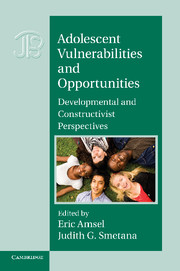Book contents
- Frontmatter
- Contents
- Figures and Tables
- Series Editor’s Preface
- Preface
- 1 Constructivist Processes in Adolescent Development
- Part I Biological And Cognitive Perspective
- PART II Social and Contextual Perspective
- 6 Testing, Testing: Everyday Storytelling and the Construction of Adolescent Identity
- 7 Adolescents’ Social Reasoning and Relationships with Parents: Conflicts and Coordinations Within and Across Domains
- 8 Representations, Process, and Development: A New Look at Friendship in Early Adolescence
- 9 Schools, Peers, and the Big Picture of Adolescent Development
- Index
- References
6 - Testing, Testing: Everyday Storytelling and the Construction of Adolescent Identity
from PART II - Social and Contextual Perspective
Published online by Cambridge University Press: 07 October 2011
- Frontmatter
- Contents
- Figures and Tables
- Series Editor’s Preface
- Preface
- 1 Constructivist Processes in Adolescent Development
- Part I Biological And Cognitive Perspective
- PART II Social and Contextual Perspective
- 6 Testing, Testing: Everyday Storytelling and the Construction of Adolescent Identity
- 7 Adolescents’ Social Reasoning and Relationships with Parents: Conflicts and Coordinations Within and Across Domains
- 8 Representations, Process, and Development: A New Look at Friendship in Early Adolescence
- 9 Schools, Peers, and the Big Picture of Adolescent Development
- Index
- References
Summary
In the sixty years since Erik Erikson (1950) cast adolescence as the prime era for identity exploration, ample research has found that reflecting on who one is indeed accelerates with approaching adulthood (see reviews by Côté, 2009; Waterman, 1982). This development usually has been captured with questions repeatedly posed across several years’ time that ask adolescents the degree to which they have struggled with and committed to a sense of who they are (see Côté, 2009; Schwartz, 2001). Consistent with the work of Erikson, these longitudinal surveys construe identity development as a self-reflective project that has little connection with the immediate social environment. Consequently, although much has been learned about the individual development of identity, the process through which identity develops in particular social contexts has remained elusive (Côté, 2009; Grotevant, 1987, 1997; Kroger, 1993; Penuel & Wertsch, 1995; Thorne, 2000, 2004).
The present chapter aims to complement this distal view of identity development by embedding the identity-making process in the everyday contexts in which adolescents make sense of their lives. Building on the work of Piaget, we suggest that the process by which adolescents reflect on their identities is empowered by their capacity for hypothetical thinking (Piaget, 1965; Piaget & Inhelder, 1969). However, we propose that hypothetical thinking is not just a thought experiment but also a social experiment that recruits the assistance of particular listeners. Overall, we view identity as continually constructed and reconstructed in the process of narrating emotional experiences to others with the aim of testing the congruence of one’s own perspective with that of a valued listener. We construe this process as rife with developmental risk and opportunity. But we are getting ahead of ourselves.
- Type
- Chapter
- Information
- Adolescent Vulnerabilities and OpportunitiesDevelopmental and Constructivist Perspectives, pp. 117 - 138Publisher: Cambridge University PressPrint publication year: 2011
References
- 6
- Cited by



